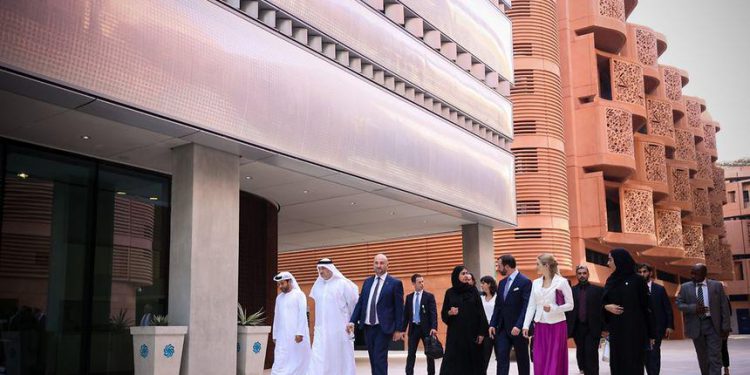Luxembourg's race to conquer the stars took a surprising pit stop this month: in the Middle East.
The space industry has been booming in Luxembourg, supported by the government as one of its "priorities" to diversify the economy.
It passed a law earlier this year providing an official framework for private investors and operators to explore and use space resources – the first of its kind in Europe.
Space exploration was firmly on the government's agenda on the official trade trip to the United Arab Emirates (UAE) and Oman on 9-13 October, led by Deputy Prime Minister and Economy Minister Étienne Schneider, alongside the Hereditary Grand Duke and Duchess of Luxembourg, Guillaume and Stephanie.
During the trip, a Memorandum of Understanding to start bilateral cooperation on space activities was signed by the UAE Space Agency and SpaceResources.lu, with a particular focus on exploration and the utilisation of space resources.
Luxembourg also became the first country to formally sign a participation contract with the organisers of Expo 2020 Dubai, the first world expo to take place in the MEASA (Middle East, Africa, South Asia) region, in which 200 countries are expected to participate around the theme of 'Connecting Minds, Creating the Future'.
The Economic Interest Group for Expo2020 – comprising the government, POST Luxembourg, satellite firm SES and the Luxembourg Chamber of Commerce – signed the agreement.
After the exhibition, Schneider said the pavilion would be sent back to Luxembourg. "We will repatriate it to Luxembourg after the Expo2020, and it will host the future Luxembourg space agency," he said.
Omar Qaise, Chief Executive at OQ Technology, was one of the 70 business leaders who formed part of the multi-sector trade delegation.
During the visit, Qaise unveiled 'thunderBox' at the GITEX Technology exhibition, a 'plug-and-play' product being designed and developed by his Wasserbillig-based company in collaboration with the European Space Agency and the Luxembourg government.
Attached to any machine or device that generates data – for example, a GPS tracker or a sensor – it can relay data back to a business.
It works like a mini wifi router that connects through small satellites controlled by OQ Technology and is aimed primarily at the oil and gas industry with pipelines in the desert or offshore rigs at sea, as well as the maritime industry for container or ship tracking.
"Wifi is normally limited to small spaces," said Qaise. "But we have invented our own wireless technology that can go hundreds of kilometres to reach our satellites without depleting the battery the way an ordinary mobile might. It can also survive in harsh environments like the desert or the sea."
Back below the stars, Luxembourg cargo airline Cargolux and Emirates SkyCargo also announced a new codeshare partnership for air cargo transportation.
It allows both carriers to procure cargo capacity on each other's flights and then offer it to their own customers, following on from a strategic partnership struck earlier this year.
"The codeshare partnership is a natural progression in our co-operation," said Richard Forson, Cargolux President and Chief Executive.























































